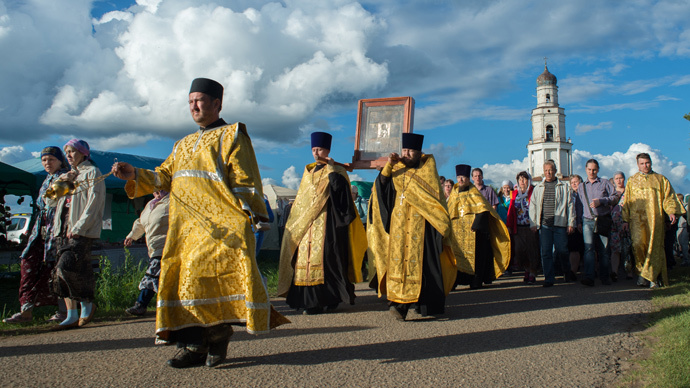Russians’ preferences for secular state become stronger

Most Russian citizens say they prefer not to change the constitutional guarantees of the state’s independence from religion, and almost half of them said they were happy with current church policies.
According to a recent poll conducted by the government owned VTSIOM agency, Russians who would rather their country be a purely secular state was 64 percent – up from 54 percent in 2007. They think the distancing of state power and religion is guaranteed by the Constitution and don’t want this changed.
Twelve percent of responders supported the idea of introducing the state’s religion into the basic law, as has been done in Greece, Saudi Arabia, the United Kingdom and other countries. Another 10 percent maintained the Russian state needed some partial religious component and pointed to the United States as an example.
Most of those polled – 47 percent also said the Church has the right and responsibility to influence public morals and ethics. Thirty-two percent answered that the Church as an institution should only be engaged in spiritual and religious affairs, and only 14 percent advocated its active role in all state and public affairs.
Also, 47 percent thought the current policies of the Russian Orthodox Church were perfect – the clergy expressed their positions when it was needed and never interfered in issues that didn’t concern the spiritual sphere. The remainder of the responders was split in half – 18 percent said the Church’s influence on society was insufficient, while another 18 percent reckoned it was excessive.
One of the VTIOM agency’s top managers, Stepan Lvov, said the growing share of Russians who preferred their country to remain secular was an interesting phenomenon that the researchers could not immediately explain. “At first glance it seems that the Church’s positions are strengthening, including increasing mass media activity, but at the same time more people want to maintain the secular basis of the state,” he said in comments with the Izvestia daily.
READ MORE: Russia to tighten rules for foreign-funded religious groups
Despite the constitutional principle of strict division of religion and state, many Russian politicians appeal to religious sentiments in their statements and actions. Earlier this year, a vocal member of the Orthodox Christian lobby, St. Petersburg city lawmaker Vitaly Milonov, even suggested introducing an official post: an ombudsman for traditional religions who would represent these communities in the state bodies. (Traditional is not strictly defined by law, but mass media and officials often use the term to describe the Russian Orthodox Church, Sunni Islam, Judaism and Buddhism).
In November 2013, State Duma MP Elena Mizulina, of the center-left Fair Russia party, suggested amending the Russian Constitution to emphasize the exclusive role of the Russian Orthodox Church. Mizulina wanted the basic law to include a preamble, saying: “Orthodox Christianity is the basis for the national and cultural originality of Russia.” The idea gained some support from other parliamentary parties, including centrist conservatives United Russia and the Communist Party, but it hasn’t yet been laid down in a legislative draft.












